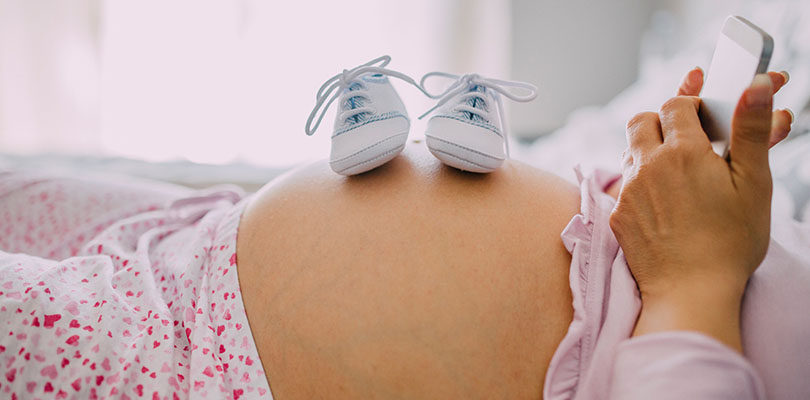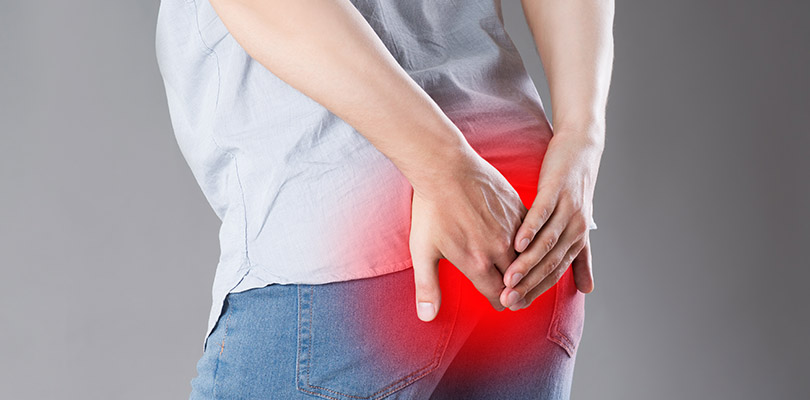Stages of Pregnancy: Symptoms to Watch for
Pregnancy is an exciting time, from the early days when you think you might be pregnant, then all the changes in your body during the three trimesters. Let’s look at the stages of pregnancy and the symptoms you can expect.
First Trimester (Months 1 to 3)
If you’re wondering if you’re pregnant, a pregnancy test is the best way to find out. You might also be feeling certain symptoms that appear in the early days. Keep in mind, every woman is unique - and symptoms will vary. In fact, some pregnancy symptoms are similar to those you experience before and after your period, which can be confusing.
Nevertheless, it’s important to keep eating a healthy diet to nurture your own body and your potential new baby. Nutrition is very critical during your pregnancy.
Early Symptoms of Pregnancy
- Missed period and morning sickness are the classic cues that you might be pregnant. There are other reasons why you might miss a period, but if your period is late, and there’s a possibility of pregnancy, consider a pregnancy test.
- Frequent urination often starts at the sixth or eighth week after conception. There can be other causes including urinary tract infection, but pregnancy hormone levels can also cause this.
- Constipation often occurs due to higher levels of the hormone progesterone that cause food to pass more slowly through your intestines. Eating high-fiber foods, drinking lots of water, and getting regular exercise will offset this problem.
- Mild headaches are caused by a change in hormones during the first trimester.
- Dizziness may occur due to changes affecting blood vessels, blood pressure, and blood sugar.
You may experience all or just a few of these symptoms. Your doctor can advise on ways to offset them. More changes you can expect:
- Cramping and spotting. During the early weeks of pregnancy, the fertilized egg attaches itself to the uterine wall. You will likely experience spotting and cramping that’s similar to menstrual cramps. A milky discharge from your vagina will develop and will be with you throughout your pregnancy. However, if it starts itching, talk to your doctor as you may have a yeast or bacterial infection.
- Breast changes. As your hormone levels rapidly change, your breasts may become swollen, and feel heavier or tender. The areola around your nipples may darken in color.
- Fatigue. If you’re pregnant, you will likely feel very tired in the early days and weeks. Your body is producing more progesterone hormone, which will lower your blood sugar, blood pressure and boost blood production. It’s important to eat foods rich in protein and iron to support your body. Also, get lots of sleep.
- Food cravings. Food preferences can change dramatically in the first months – your cravings and aversions. This typically lessens by the second trimester.
Second Trimester (Months 4 to 6)
When you enter the second trimester, you will likely start to feel less tired. Morning sickness has faded away, and you start to feel more energetic. This is the most enjoyable stage of pregnancy, so make the most of it. You can get the nursery ready for your new baby.
What Happens During the Second Trimester of Pregnancy?
The baby is growing quickly. Your body is also growing quickly, your belly and breasts. You’re halfway into your pregnancy. At this point, an ultrasound will reveal the sex of your baby.
What Symptoms Can You Expect During the Second Trimester?
During this time, many women report thicker hair which they love. But they also experience many other physical changes that need attention:
- Backaches. With the extra weight you and your baby have gained, there is pressure on your back. Sit up straight to ease the pressure. Sleep on your side with a pillow between your legs. Don’t carry anything heavy. Wear comfortable shoes with arch support. Get a pregnancy massage to ease the back pain, or ask your partner.
- Breast enlargement. As your breasts prepare to feed the baby, your bra size will grow. A support bra will help keep you comfortable.
- Bleeding gums. Hormone changes will make your gums more swollen and tender. Use a softer toothbrush if gums are sensitive. Just make sure you continue with good oral hygiene, including flossing daily, to avoid gum disease during pregnancy. Studies show that gum disease can cause pregnancy complications. See your dentist regularly.
- Nasal problems. You may have more nosebleeds or congestion during pregnancy due to hormone changes. Talk to your doctor before using a decongestant. A humidifier will help keep indoor air moist to avoid nosebleeds.
- Vaginal discharge. A milky vaginal discharge is common during pregnancy. A panty liner is a better choice than a tampon, which can bring germs into the vagina. If the discharge changes in color, tell your doctor as it may signal an infection.
- Mild headaches. This is a common complaint and can be offset by a good night’s sleep and various relaxation methods including meditation and deep breathing. Don’t take aspirin or ibuprofen during pregnancy. Ask your doctor about acetaminophen.
- Stomach problems. You may experience constipation and/or heartburn due to the increased progesterone in your body. Avoid large meals as well as greasy, spicy foods. Eat high-fiber foods and drink extra water. Regular physical activity like walking also helps.
- Skin changes. Your skin may glow due to hormone levels that flush the face. You may also develop brown marks on your face and a dark line down your abdomen. These will fade when the baby is born. Makeup can conceal them in the meantime. Your skin may be more sensitive, so use a broad-spectrum (UVA/UVB protection) sunscreen (SPF 30) outside. Purple stretch marks will appear; they will fade after you deliver.
- Varicose veins and hemorrhoids. Extra blood flowing to the lower part of your body, and greater pressure from your growing uterus, will cause these discomforts. A warm tub or sitz bath will help ease the veins; your doctor can advise you on hemorrhoid treatments.
- Weight gain. Once you get past morning sickness, your appetite will return. Take care not to overeat, as you only need about 300 to 500 extra calories daily during this time. Your doctor will want you to gain just ½ to 1 pound per week.
While many people understand the importance of meningitis vaccinations, there is still a stigma around it – especially about how effective the vaccine is.
Your Baby Is Moving!
By week 20, you will start to feel movement in your belly. “Quickening” is the term often used for this flutter of activity. Don’t be concerned if your baby isn’t showing signs of movement at this point. For some, it’s not evident until the sixth month of pregnancy.
Symptoms of a Problem
If you experience any one of these signs, call your doctor immediately:
- Bleeding
- Severe abdominal cramping
- Severe dizziness
- Change in weight gain – either very rapid or very little. More than 6.5 pounds per month is a concern, as is less than 10 pounds at 20 weeks.
Third Trimester (Months 6 Through 9)
By the third semester, you will feel the physical challenges of pregnancy. At this point, your body and your baby will be growing faster; your baby will show more movement.
What Symptoms Should You be Aware of?
You will have more frequent visits to your health care provider. These are to check the baby’s position and changes in your cervix. It’s time to start asking your doctor more about the final weeks of pregnancy and delivery.
This last stage of pregnancy is often emotionally and physically challenging. You can expect to continue to experience backaches, heartburn, constipation, breast enlargement, varicose veins, constipation.
A few changes to expect:
- Breast discharge. Close to your due date, your nipples may start leaking yellowish liquid. This is called colostrum and nourishes the baby right after birth.
- Braxton Hicks contractions. These mild contractions are a prelude to labor, but they aren’t labor contractions. When contractions gradually get closer together, and more intense, they are the beginning of labor. Call your doctor.
- Shortness of breath. In the last stages of pregnancy, your uterus rises up until it sits just under your rib cage. Your lungs have less room to expand, and there’s added pressure on your lungs. If you feel short of breath, try a mild exercise like walking. Prop up your pillows when you sleep.
- Swelling. Your fingers, ankles and face are likely swollen due to fluid retention. It helps to prop your feet up when you sit. If swelling develops suddenly, contact your doctor immediately. You may have preeclampsia, which is a dangerous condition.
- Spotting. Bleeding may be a sign of a serious problem, and could signal preterm labor. Call your doctor right away when you notice any bleeding.
- Vaginal discharge. If the flow soaks through your panty liner, call your doctor. The color will be clear or slightly red. This is your mucus plug, and it's a sign that your cervix has begun dilating in preparation for labor. A sudden rush of fluid may mean that your water has broken. Call your doctor immediately.
Symptoms of a Problem
Call your doctor immediately if you have any one of these symptoms:
- Severe abdominal pain or cramps
- Severe nausea or vomiting
- Bleeding
- Severe dizziness
- Pain or burning during urination
- Rapid weight gain (more than 6.5 pounds per month) or too little weight gain
The Good News: Your Baby Will Arrive Soon!
Your baby is completely developed and is gaining weight quickly. You will feel baby’s kicking and stretching. Your baby can make grasping motions and will respond to sound. Baby’s lungs and brain are still developing in the last weeks. Sleeping patterns are developing.
In the Very Last Weeks of Pregnancy
- The fetus drops lower into the pelvis.
- More fat accumulates, especially around the elbows, knees, and shoulders.
- The fetus gains about 1/2 pound per week during this last month of pregnancy.
At the start of week 39, your baby is considered full term. You will continue regular visits to your healthcare provider. It’s important to ask questions during this time. You want to be prepared for your final stages of pregnancy and delivery.
While pregnancy problems might be on your mind, your health care provider can help you make the best decisions for you and your baby.







